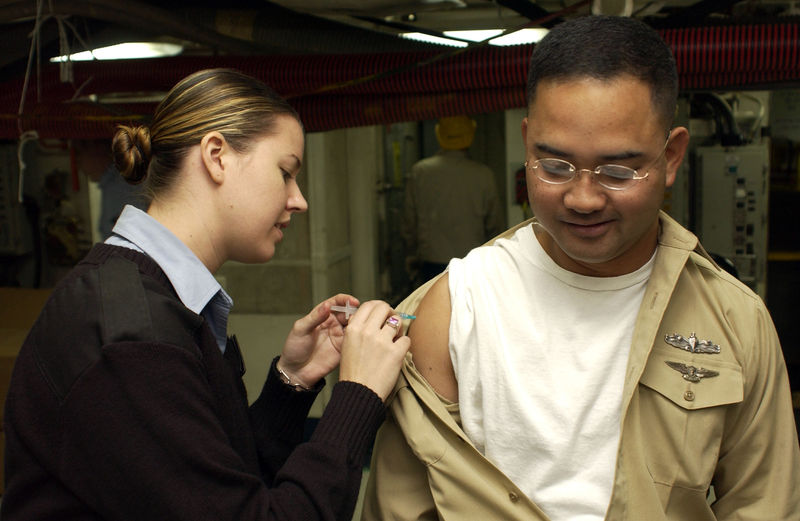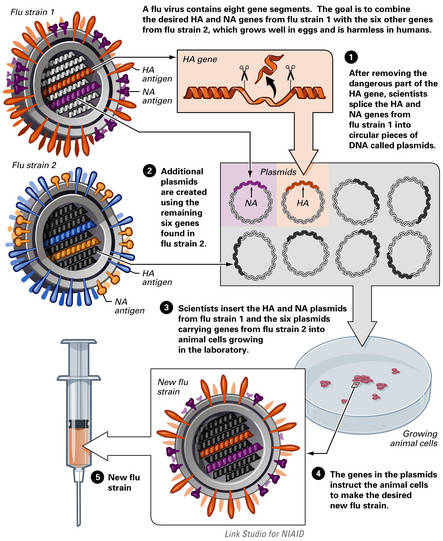Virus Vaccination
Interview with
Well we've already heard about how flu actually causes disease, how it invades us, how it hijacks our cells and makes us feel generally grotty but how do we actually prevent it? John Wood is from the NIBSC, that's the National Institute of Biological Standards and Controls which means he works with flu vaccines. Hi John.
John - Hello.
Chris - What's in a flu vaccine that prevents us from getting sick and does it actually work?
 John - Most of the flu vaccines are produced by growing the virus in hens' eggs. The viruses are purified from the hen's egg fluids. They're chemically treated so they're no longer capable of infecting people. These purified virus particles or components of them are used to give to patients by inter-muscular injection. This, in turn, stimulates the body's immune system into thinking they've been invaded by flu.
John - Most of the flu vaccines are produced by growing the virus in hens' eggs. The viruses are purified from the hen's egg fluids. They're chemically treated so they're no longer capable of infecting people. These purified virus particles or components of them are used to give to patients by inter-muscular injection. This, in turn, stimulates the body's immune system into thinking they've been invaded by flu.
Chris - You're showing this viral shrapnel to the immune system so that it gets a sneaky preview of what the virus looks like. It makes an immune response: does it make as good an immune response as if you actually catch the flu?
John - It's thought not. The best way is stimulating a robust immune response which will give you protection for months and months to come is an infection itself.
Chris - We had an email from Mark in Bletchley who says, 'I've been in contact with someone who's had the flu quite badly but I didn't catch it. Why would that be?'
John - Well, I don't know the particular circumstances. It's possible, I hope, that maybe he had a vaccine but maybe not. He could have been exposed to flu in the past which gave him some immunity. Maybe he didn't know he'd been exposed to flu in the past. It may have been a kind of sub-clinical infection he didn't notice. I expect he had some kind of immunity.
Chris - Ed was saying the flu mutates as it goes around the world and this is why we get consistent outbreaks year on year. How do you make sure the vaccine is going to work every year?
John - This is a big problem and the WHO has a worldwide network of laboratories. They have over 120 so-called national influenza centres around the world. They monitor the newly emerging flu viruses. They analyse them and compare them with the previous years' flu viruses. Specifically, they're looking at the surface proteins to see how much they vary because these are the hypervariable part of the virus. The activities of these national centres are coordinated by four collaborating WHO centres. We have one here in the UK at Mill Hill in London, one at CDC in Atlanta, one in Tokyo and one in Melbourne. The directors of these centres come together twice a year in Geneva, the headquarters of the WHO to analyse all the data. I'm unfortunate that I'm asked along because they like to have some of the key regulating laboratories as well. We have to deal with the fall-out from any new strain. We look at all the data, we look at how the immune system was stimulated by last year's vaccine, recognises the vaccine. We look at the genetic properties of the new viruses, how these viruses react with the immune system and we make a prediction of which strains are likely to cause flu next year.
Chris - Is this based on viruses that are doing the rounds in the southern hemisphere? So when it's their summer and it's our winter here we're collecting viruses at the moment. Are we going to send them to their flu season next year so they can make vaccine?
John - It often does happen like that, yes. I said the WHO experts meet twice a year: once for the northern hemisphere recommendation and that's coming up in the next month and one for the southern hemisphere recommendation which is usually September. If you monitor very carefully what happens in the other hemisphere it's a very good indication what we're going to get next year.
Chris - Lots of people are saying if we're going have a pandemic of flu why are people worrying about antiviral drugs that are, at best, not very good? Why aren't we making a vaccine against pandemic flu?
John - We are making - we are trying to develop vaccines against pandemic flu. There are huge problems in trying to make the vaccines against pandemic flu. If we think it's going to be H5N1 there are lots of different varieties of H5N1 that are causing infections, lethal infections in birds. Well over six genetic groups have been recognised of H5N1. You will expect that a vaccine produced from one of these genetic groups may not give you protection against another one. There's no way of knowing which one would actually cause a pandemic in the future.
Chris - It sounds like a horrible pun but you don't want to put all your eggs in one basket; put all your vaccine into one particular type that might not end up being that type which causes the infection?
John - That's correct. You don't even know that it's going to be H5N1. It could be an old pandemic virus such as H2N2 from 1957-68.
Chris - I've got an email here from Ryan Bradley who says, 'I try to hold my sneezes in at least to have the air coming out of my mouth as opposed to my nose. The reason is I don't like spewing mucous out of my nose, onto my hands and other people.' The pressure doesn't bother me so I was wondering if this practise is at all detrimental to my health or if it defeats the purpose of needing to sneeze.'
John - I think it sounds a little bit dangerous practise to me.
Chris - We've had a call from John in Colchester who says, 'what about long haul flights when moving viruses around the world. This must be a major consideration and are there steps taken to sterilise the air on aeroplanes and things like that?'
John - I don't think steps have been taken to sterilise the air but certainly talking to people who've been on long haul flights they often complain of respiratory symptoms after the flights because the air is re-circulated. The tourist class syndrome, they think they're getting worse air than business class. I really don't know the mechanics of this.
Chris - Thank you very much, John.

- Previous Finding Flu Fast
- Next Red Ant, Dead Ant...










Comments
Add a comment